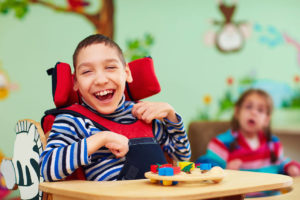Cognitive Impairment & Cerebral Palsy
Not everyone with cerebral palsy will have an intellectual disability. In fact, some people with CP are fully-developed mentally and have no cognitive issues at all. When there are mental impairments however, they can be severe.

Cerebral Palsy and Mental Impairment
Cerebral palsy is oftentimes accompanied by certain developmental disabilities. About 1/3 of children with cerebral palsy have mild cognitive impairment, 1/3 have moderate to severe impairment, and 1/3 show no signs of cognitive impairment at all. Approximately 1/4 of children with CP reportedly have additional learning problems.
To make certain that your child gets the proper treatment for these conditions, it’s imperative that you understand them for who they are, and learn what you can do to make life for your child easier and more-rewarding.
Monitoring Progress
During the first part of your child’s life, assessing the actual level of cognitive impairment or other developmental disabilities may be difficult. Most of the time, you’ll only be able to make good assessments of these issues when the child is a bit older and when you can compare their progress in school with those of children who do not suffer the same disabilities.
Special education programs and tutors are great resources toward making certain that you get an accurate assessment of the level of cognitive impairment your child suffers at every part of their life.
When your child starts school, the school will likely have resources that can help to assess where they are in terms of their cognitive development. Oftentimes, this will involve quite a bit of testing. As your child’s disabilities come to be understood to a greater depth, the school (and you) can determine what resources they need to have access to, and what reasonable expectations you should have of them during their school career.
Coping with the Learning Problems
Simply because someone has a learning disability, this does not mean that they’re incapable of learning. There are some common issues with cerebral palsy sufferers in school. For instance, people with CP tend to progress normally in some subjects, but have significant problems with others. This really doesn’t make them much different than anyone else, of course, as some people are very good at reading and very poor at math or have other strengths and weaknesses. With good educational resources, even people with more-significant mental impairments can learn to read and write, which is a huge victory and opens up entire new worlds for people.
However, people with CP may very-well need more time to learn than their peers. Some people may be able to overcome these challenges with the help of a tutor who knows how to work with individuals who have disabilities. Others may never be able to get past a certain grade level, but they can still live rich and rewarding lives.
Challenging Activities
Children with cognitive issues need to be challenged, and need to be presented with ways to experience a sense of accomplishment, just as any child does. You’ll want to make certain that any special education programs or tutors that your child uses include genuine opportunities for them to excel and to learn in their programs. Provided that their cognitive impairment isn’t too severe, children with cerebral palsy oftentimes end up going on to further education after high school and achieving quite a bit in their academic careers.
People with intellectual disabilities may also have a hard time adapting to new and novel situations. Routine is oftentimes very important to them, and upsetting their routines can be very disturbing. Anticipate this. With a bit of encouragement and learning, people with intellectual disabilities can learn to be more open to adapting to new situations.
Emotional Issues
Children with intellectual disabilities sometimes have emotional outbursts. Parents and teachers can help by learning the triggers and providing opportunities for the child to get used to whatever disturbs them. Sometimes, the outbursts are inevitable and have to be accommodated. Patience, understanding, and a willingness to grow as a person will help you to overcome frustration with these issues.
There are sometimes social issues as well, because people with CP often cannot socialize as easily as their peers. They may have some level of social impairment for a while, but the solution to this is to make sure that they have opportunities to socialize, and are encouraged to do so.
There are different levels and types of intellectual disabilities, just as there are different types of cerebral palsy. If your child is suffers from a cognitive impairment, you might have to learn to deal with the challenges that an intellectual disability can create for parents. Fortunately, there are great organizations out there, and there is plenty of information available that can help.
** Note that in some situations, the term “mental retardation” is still used to refer to an intellectual disability, particularly where federal law is concerned. Though this term is no longer commonly-used (or necessarily politically correct), you may find it still used in various places.
